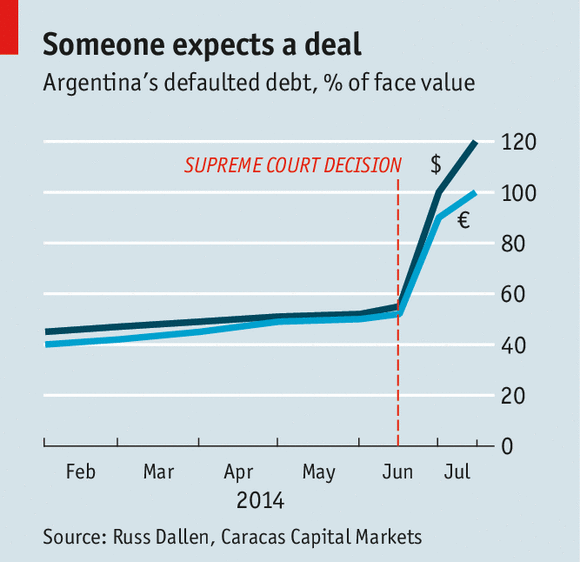Argentina's debt saga
Unsettling times
The clock is ticking toward an Argentine default
Jul 26th 2014 | Buenos AiresITS steakhouses bustle, its shopping malls teem. There are few signs that, on July 30th, Argentina could default for the eighth time. Yet the chances are rising.
The countdown started on June 16th, when the Supreme Court of the United States announced that it would not get involved in Argentina's battle with NML Capital, a hedge fund that picked up cheap debt after Argentina's 2001 default and has since litigated for payment of full principal plus interest. The decision left intact a ruling by Thomas Griesa, a New York district-court judge, which banned Argentina from paying the creditors who in 2005 and 2010 swapped 93% of defaulted debt for performing securities, if the country did not also pay NML what it wants.
- Unsettling times
- Eyes on the classroom
- Roya flushed
- All systems slow
Argentina was left with only thorny choices: pay NML the $1.3 billion plus interest awarded by Judge Griesa; negotiate a settlement with the hedge fund; or stop paying the exchange bondholders. A payment due on June 30th to those exchange bondholders was missed. The grace period expires on July 30th, at which point Argentina will again be in default.
Full payment would be hard to swallow. President Cristina Fernández de Kirchner has always opposed stumping up, and a generous payment for NML would open the door to similar payouts to other "holdout" creditors. The consensus has been that Argentina would reach a negotiated settlement with the holdouts. Argentina had made good progress this year in its quest to regain access to capital markets—settling disputes with the Paris Club of government creditors, for example. Tackling the holdout issue was the logical next step. The price of dollar-denominated defaulted debt surged above face value after the Supreme Court's ruling, opening up a gap with euro-denominated debt that is not subject to New York law (see chart).

Yet the weeks have since been frittered away. Argentina's principal tactic has been to try to win a stay from Judge Griesa. It claims it cannot arrange a settlement with the holdouts without potentially triggering the Rights Upon Future Offers (RUFO) clause written into its restructured bonds. This clause, which expires on December 31st, specifies that Argentina cannot voluntarily offer holdouts a better deal than it did during its 2005 and 2010 restructurings without extending the offer to all bondholders. Argentina has argued that violating this clause would risk a flood of bondholder claims and could leave officials vulnerable to criminal prosecution for increasing its debt. A stay until the expiry of the RUFO clause is the answer, it says.
NML insists Argentina is overegging the RUFO worry: given that the country has appealed its case all the way up to the Supreme Court and been rebuffed, a judge is unlikely to deem any deal "voluntary". More importantly, Judge Griesa is having none of it. In a July 22nd hearing, he rejected the request for a stay and ordered the holdouts and Argentina to negotiate "continuously" with a court-appointed mediator in order to reach a deal. "The reference to the restrictions of the RUFO clause does not help because that clause was self-imposed by Argentina and therefore hard to use as an argument," says Eugenio Bruno, a debt-restructuring lawyer.
A settlement would be in the interest of exchange bondholders, who would keep getting paid. It would also clearly suit the holdouts. Default would deprive NML of both a payout and its status as a disadvantaged creditor: unless Argentina is paying other bondholders and not paying NML, its claim for equal treatment is void. The fund's representatives have stated they are willing to bend on timing as well as payment structure, offering to accept a mix of bonds and cash to lower the hit to Argentina's foreign reserves. Workarounds for the RUFO problem may also be possible. Argentina could ask its exchange bondholders to waive the clause, though time is now short to secure the majority consent that is required. Some think Argentina could give NML promissory notes which it could exchange for performing securities in 2015, after the RUFO term expires. Failing that, the country could just pay NML the full amount, as ordered, which would be more likely to be deemed involuntary.
The unknown is how desperate Argentina is to avoid default. The country has survived 13 years without access to dollar-bond markets. It may calculate that its efforts to keep paying the exchange bondholders, allied to general suspicion of the holdouts, will stand it in good stead with mainstream creditors. Ms Fernández has worked hard to convince Argentines that Judge Griesa and the "vulture" funds would be to blame if the country defaults.
The costs for the outside world would be containable. Few investors would be shocked if Argentina defaults. Its outstanding debt under foreign law—what analysts call the "defaultable universe"—amounts to only $29 billion, far less than the $81 billion it reneged on in 2001.
On the other hand default would have real costs for Argentina. Its isolation from dollar-bond markets would continue. Its foreign-exchange reserves have dwindled over time. Borrowers such as YPF, the state oil firm that has placed bonds in global markets, would face higher interest rates—risking delays to the development of Vaca Muerta, a huge shale formation. Rising local demand for dollars is already putting pressure on the peso in the unofficial market. All of which would make it even harder for the country to crawl out of recession.
Default would also mean another foray into the legal labyrinth, by triggering "acceleration clauses" that give bondholders the right to demand immediate repayment. These clauses exist in all of the country's foreign-law bonds, not just the ones governed by New York law, opening Argentina up to court battles in other jurisdictions, too. Easy answers there are none.
The Economist
No hay comentarios.:
Publicar un comentario